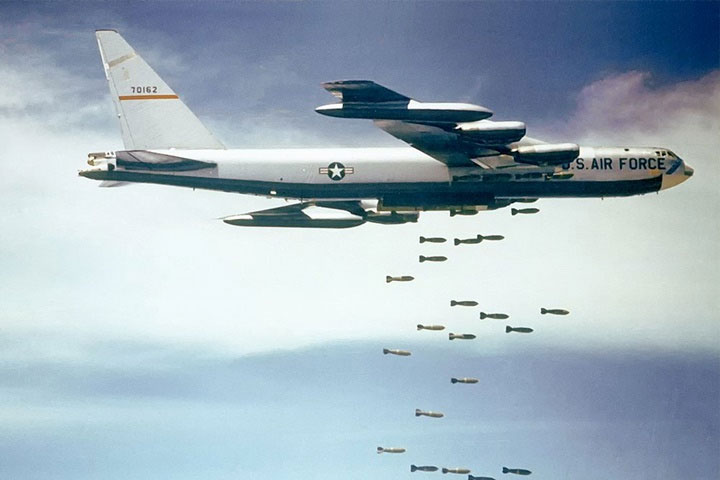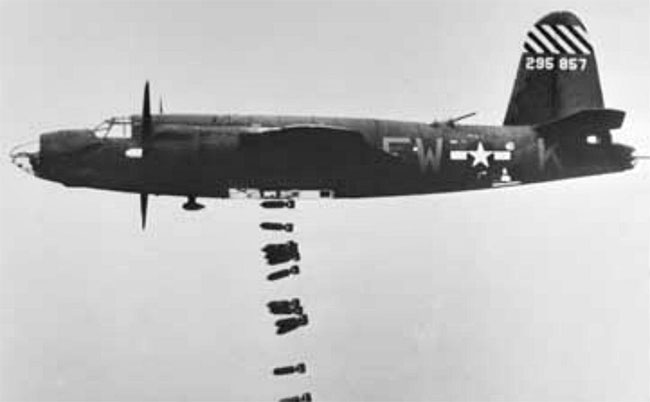Why do bombs make whistling sounds when they fall?
Why do bombs make whistling sounds when they fall?
According to Science ABC , Gravity's Rainbow - the great novel in World War II by Thomas Pynchon - begins with one of the most memorable sentences in literature. A scream echoed in the sky. It happened before, but nothing to compare with now. It is too late.

The Germans designed bombs to make a whistling sound when it fell.
The sound is described as the "whistling" sound created by a V-2 rocket when it falls in the sky during the destruction mission. Movies and TV shows when talking about 20th-century wars often include such a whistling sound when describing a falling bomb. For those who are not familiar with military technology, this whistling whistle may sound quite strange, they may think that at the battlefield giving such warning sounds to the enemy is not wise. First of all, did that whistling really exist, and if so, what caused it?
Sounds of bombs falling
When you're watching a Hollywood re-enactment of a famous battle in World War 2, the screech of falling bombs will definitely help create stress, but there's a truth behind this scary sound. During World War II, the Germans designed bombs to make a whistling sound when it fell. Normally, a metal object with sharp edges, such as a bomb will produce a small noise when falling in the air, unless it exceeds the sound barrier (343 meters per second) it will create Bang.
However, by designing whistle-like attachments, the Germans used as much psychological warfare as physical warfare. Whistling is related to death from above, and because bombing attacks in London and other European cities are usually done in the middle of the night, the whistling sound becomes a nightmare sound. and worry. The survivors of the London bombing still remember the haunting whistles of death from their underground shelter.

Many people think that whistling is a warning to civilians about the upcoming danger.
Some historians and soldiers argue that whistling is a warning to civilians about the danger ahead , so they may have time to cover up or run away, but the theory collapses when you look. into the physical aspect of such sounds. It is almost impossible to tell which direction the bomb came from by the whistling sound, so it can be pointed straight at you, or you can land 120 meters away. Moreover, the bomb's flight time will be relatively short, so even if you hear the whistling sound of a bomb falling, you will have very little time to react or flee immediately.
There is also a special German fighter, called Stuka, designed to make a whistling sound every time it hits. This has the same effect as falling bombs (the aircraft can emit this sound just before the bomb falls, so it is very important to distinguish it).
Physical problem of whistling
For those who pay attention to small details, describing bombs falling in Hollywood movies is often inaccurate. When the bomb is dropped and the whistling starts, the pilot will hear the pitch start quite high and then gradually decrease as he leaves the source causing noise; This is a classic sound effect (sounds like "Wheeeeeeezzzzz —– Boom!" ) and you may have heard in movies or cartoons.
The pilots who heard the bombs were the classic effect on films. In fact, quite the opposite, when the whistling bomb quickly approached the ground, thanks to the Doppler Effect , the whistling sound would increase, just like the police siren increased when it approached you. In other words, the whistle will reach the highest level right before the impact on the ground, but that's rarely the sound effect added to the battle scenes!
- The sound of 'whistling' leaps out of the Caribbean Sea
- The reason you should not whistle when you are in Thailand
- Chorus of plasma waves around the Earth
- Dolphins call each other by whistling
- The secret helps you to know how to whistle in a single note
- The terrible truth about the damage of nail bombs
- What is a thermo-weapon?
- Strange language: Whistling to communicate
- Differences between atomic bombs and fusion
- 10 sounds make people feel the most uncomfortable
- American bizarre bombs only kill people, do not destroy houses
- Japan used to build bombs flying across the ocean
 'Fine laughs' - Scary and painful torture in ancient times
'Fine laughs' - Scary and painful torture in ancient times The sequence of numbers 142857 of the Egyptian pyramids is known as the strangest number in the world - Why?
The sequence of numbers 142857 of the Egyptian pyramids is known as the strangest number in the world - Why? History of the iron
History of the iron What is alum?
What is alum?